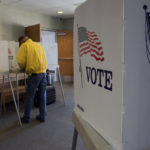Absentee voting concerns raised under new law

A man votes at New York Elementary School in this 2011 file photo. An election law written by Secretary of State Kris Kobach, which requires photo ID to vote, is raising concerns about what that means for absentee voting.
Topeka ? An election law written by Secretary of State Kris Kobach that requires photo identification to vote and other restrictions is raising new concerns about absentee voting.
Under the law, county election officials must decide whether the signature on a request for an advance ballot matches the person’s previous signature that could be on a voter registration form or another type of identification.
If it doesn’t, the election official must make an effort to contact that person to give them another attempt at signing the application.
But Rep. Ed Trimmer, D-Winfield, said the law and its accompanying rules and regulations failed to prescribe how much of an effort the county election official must make to track down the potential voter and clear up the dispute.
“This gives a lot of leeway to the election officer,” Trimmer said.
He said many times, people who request advance ballots will be difficult to reach because they requested an advance ballot knowing they would be elsewhere around the time of the election.
Legislators said there could be good reasons that a person’s signature requesting an advance ballot looks different from a previous signature. The person’s ability to sign their name could be affected by age or illness, they said.
But Kansas Secretary of State Kris Kobach, a Republican who pushed for the new law, said he believed Kansas’ county election officers would make a good faith effort to ensure those who are eligible to vote will receive an advance ballot.
Rep. Valdenia Winn, D-Kansas City, however, wasn’t assured. “My level of discomfort is getting higher and higher,” Winn said.
Douglas County Clerk Jamie Shew said his office sometimes receives signatures on advance ballot applications that don’t look the same, and he contacts the applicant.
He said it is usually a situation where a husband signs for a wife or vice versa and once they are contacted they make the necessary correction, he said.
Shew said in his discussions with other election officials he was confident they will “go above and beyond” to ensure that no one who is eligible to vote is denied the opportunity cast a ballot.
But, he said, that during presidential elections, which have the heaviest voter turnout, “your ability to follow up may be affected by how much is on your plate at that moment.”
In 2010, nearly 30 percent of all votes cast statewide, including 18 percent in Douglas County, were in advance, according to the secretary of state’s office. In 2008, the last presidential election, that percentage was 36.8 percent statewide, or 464,822 votes, and 32.7 percent in Douglas County, or 18,207 votes.
Kansas is among a handful of states that have approved laws requiring photo identification to vote and other requirements. But Kobach said Kansas has done more than any other state “to close loopholes on advanced voting.”
Last month, the U.S. Justice Department rejected South Carolina’s law requiring voters to show ID at the polls, and a similar law in Texas is under review. The Justice Department said the South Carolina law could suppress the voting rights of minorities.







